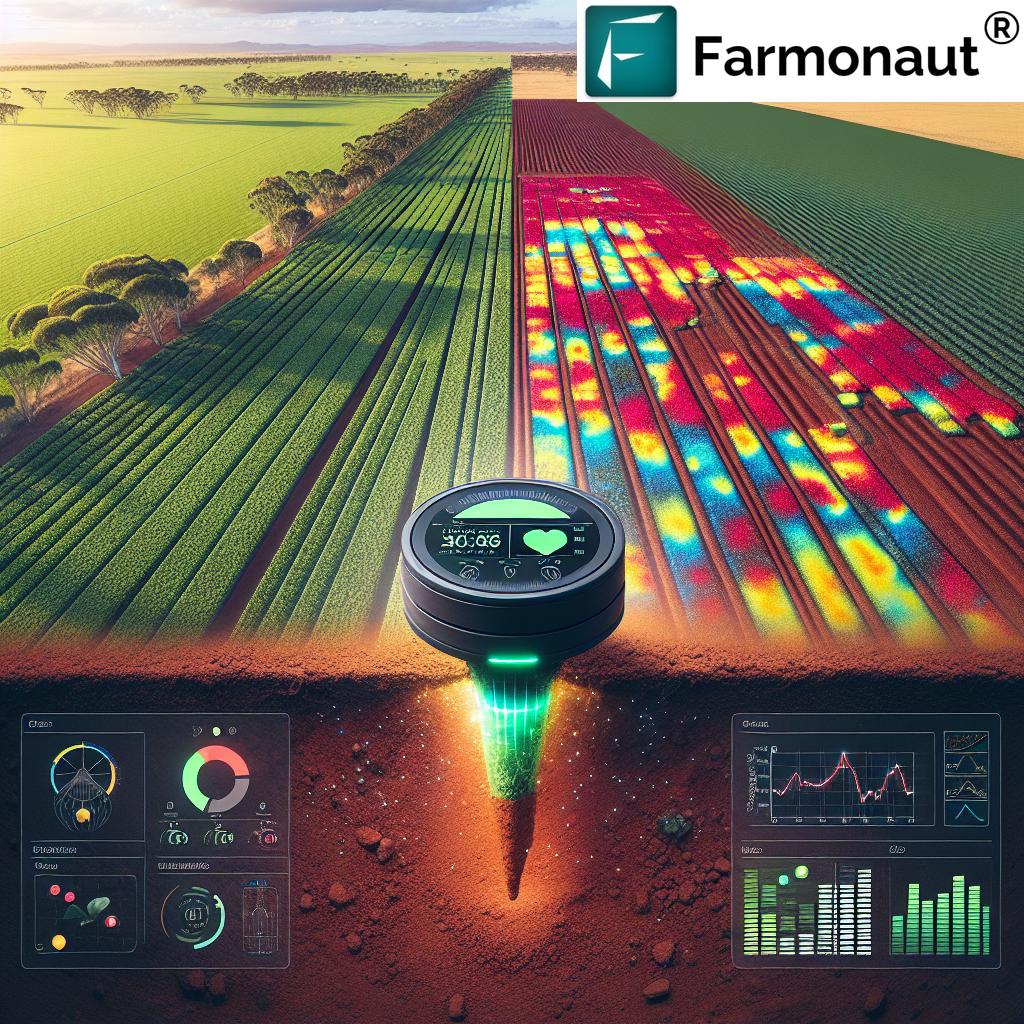Unlock Your Agribusiness Potential: Online Courses in Agriculture and Horticulture Management in NSW
“NSW offers over 20 different online agriculture and horticulture management courses, catering to diverse farming interests.”
Welcome to our comprehensive guide on agribusiness management courses and agriculture training programs in New South Wales (NSW), Australia. We’re excited to take you on a journey through the world of advanced agricultural education, where traditional farming wisdom meets cutting-edge technology and sustainable practices. Whether you’re a seasoned farmer looking to upgrade your skills or an aspiring agriculturist ready to sow the seeds of your future career, this article will provide you with valuable insights into the diverse educational opportunities available in NSW.
The Growing Importance of Agricultural Education
In today’s rapidly evolving agricultural landscape, continuous learning and skill development are crucial for success. NSW, with its rich agricultural heritage and forward-thinking approach to farming, offers a fertile ground for those seeking to enhance their agribusiness acumen. From advanced diplomas in agribusiness to specialized certifications in agronomy, the state provides a wide array of educational pathways designed to cultivate the next generation of smart, skilled agricultural professionals.
As we delve into the world of agricultural education in NSW, we’ll explore various aspects, including:
- Online and on-campus course options
- Sustainable farming practices and precision agriculture techniques
- Agricultural technology training and its real-world applications
- Financial assistance and support for international students
- Recognition of prior learning opportunities
- Career pathways in agriculture and horticulture
Let’s begin our exploration of the educational landscape that’s shaping the future of farming in NSW and beyond.
Online Agricultural Education: Flexibility Meets Innovation
In an era where digital technology is transforming every aspect of our lives, online agricultural education has emerged as a powerful tool for aspiring and experienced farmers alike. NSW institutions have embraced this trend, offering a range of online courses that provide flexibility without compromising on quality.
Benefits of Online Agribusiness Management Courses:
- Flexibility to study at your own pace
- Access to course materials 24/7
- Opportunity to balance work and study
- Reduced travel and accommodation costs
- Exposure to digital tools used in modern agriculture
Many institutions in NSW offer online versions of their popular agriculture and horticulture training programs. These courses cover a wide range of topics, from basic farming techniques to advanced concepts in agribusiness management and sustainable agriculture.
Advanced Diploma in Agribusiness: Cultivating Future Leaders
For those looking to take their agricultural career to the next level, an Advanced Diploma in Agribusiness offers a comprehensive pathway to success. These programs are designed to equip students with the knowledge and skills needed to manage complex agricultural operations and make strategic business decisions.
Key Features of Advanced Diploma Programs:
- In-depth study of agricultural economics and finance
- Focus on sustainable farming practices
- Training in agricultural technology and innovation
- Development of leadership and management skills
- Real-world projects and industry placements
Graduates of these programs often find themselves well-positioned for roles in farm management, agribusiness consulting, and agricultural policy development. The skills gained through an Advanced Diploma can significantly enhance farm productivity and profitability.
“Advanced diplomas in agribusiness can increase farm productivity by up to 30% through improved management techniques.”

Sustainable Farming Practices: The Future of Agriculture
As the world grapples with climate change and environmental concerns, sustainable farming practices have become more important than ever. NSW educational institutions are at the forefront of teaching these crucial techniques, integrating them into various courses and programs.
Key Areas of Focus in Sustainable Agriculture Courses:
- Soil conservation and management
- Water-efficient irrigation techniques
- Integrated pest management
- Organic farming methods
- Biodiversity preservation
- Renewable energy in agriculture
By learning these practices, students are not only preparing themselves for the future of farming but also contributing to the long-term health of our planet. Many courses in NSW now include practical components where students can apply these sustainable techniques in real farm settings.
Precision Agriculture: The Technological Revolution in Farming
Precision agriculture is revolutionizing the way we farm, and NSW is ensuring its students are at the cutting edge of this technological transformation. Courses focusing on precision agriculture techniques are becoming increasingly popular, offering students the chance to learn about the latest innovations in farming technology.
Key Components of Precision Agriculture Training:
- GPS and GIS technologies in farming
- Drone technology for crop monitoring
- Data analysis and interpretation
- Variable rate technology for resource optimization
- Sensor technology for soil and crop health monitoring
One of the leading technologies in this field is offered by Farmonaut, a pioneering agricultural technology company. Farmonaut provides advanced, satellite-based farm management solutions that complement the skills learned in precision agriculture courses. Their platform offers valuable services such as real-time crop health monitoring, AI-based advisory systems, and resource management tools.
Students can access Farmonaut’s solutions through various platforms:
For those interested in integrating Farmonaut’s technology into their own systems, the company also offers API access. You can find more information about their API at Farmonaut API and access the developer documentation at API Developer Docs.
Agricultural Technology Training: Bridging the Gap
As technology continues to play an increasingly important role in agriculture, many NSW institutions are offering specialized agricultural technology training programs. These courses aim to bridge the gap between traditional farming knowledge and modern technological advancements.
Key Areas Covered in Agricultural Technology Training:
- Farm management software systems
- IoT (Internet of Things) in agriculture
- Robotics and automation in farming
- Blockchain technology for supply chain management
- Big data analytics in agriculture
By combining hands-on experience with theoretical knowledge, these programs prepare students to implement and manage technological solutions in various agricultural settings. This skill set is becoming increasingly valuable as farms of all sizes adopt new technologies to improve efficiency and productivity.
Rural Education Programs: Bringing Knowledge to the Countryside
Recognizing the unique needs of rural communities, NSW offers several rural education programs designed to bring quality agricultural education directly to those living and working in the countryside. These programs often combine online learning with periodic in-person workshops or field days.
Benefits of Rural Education Programs:
- Tailored to the specific needs of rural communities
- Reduced need for long-distance travel
- Opportunities for community-based learning
- Focus on practical, locally-relevant skills
- Flexible scheduling to accommodate farming seasons
These programs play a crucial role in ensuring that the latest agricultural knowledge and techniques reach even the most remote farming communities in NSW.

Agronomy Certification: Specializing in Crop Science
For those interested in the science of crop production and soil management, agronomy certification programs offer a specialized path to expertise. These programs delve deep into the intricacies of plant growth, soil health, and crop management.
Key Components of Agronomy Certification Programs:
- Advanced soil science and management
- Crop physiology and nutrition
- Weed science and management
- Plant breeding and genetics
- Precision agriculture applications in agronomy
Agronomists play a crucial role in optimizing crop production and developing sustainable farming practices. With the increasing focus on food security and sustainable agriculture, the demand for skilled agronomists is on the rise.
Financial Assistance and Support for Students
Pursuing higher education in agriculture can be a significant investment, but NSW offers various financial assistance options to support students in their educational journey.
Available Financial Support Options:
- VET Student Loans for eligible courses
- Smart and Skilled subsidies for NSW residents
- Scholarships specific to agricultural studies
- Payment plans and flexible fee structures
- Industry-sponsored programs and internships
International students studying agriculture in NSW may also be eligible for certain scholarships and support programs. It’s important to check with individual institutions for the most up-to-date information on financial assistance options.
Recognition of Prior Learning: Valuing Experience
Many agricultural education programs in NSW offer Recognition of Prior Learning (RPL) options. This process acknowledges the skills and knowledge gained through work experience, previous studies, or life experiences.
Benefits of RPL:
- Reduces course duration
- Lowers overall course costs
- Recognizes practical, on-farm experience
- Allows for customized learning paths
- Encourages lifelong learning in the agricultural sector
RPL can be particularly valuable for experienced farmers looking to formalize their knowledge or gain additional qualifications without repeating content they already know.
Course Comparison Matrix
| Course Name | Institution | Duration | Mode of Study | Key Focus Areas | Career Outcomes | Estimated Cost (AUD) |
|---|---|---|---|---|---|---|
| Advanced Diploma in Agribusiness Management | TAFE NSW | 2 years | Online/On-campus | Business management, Agricultural economics, Sustainable practices | Farm manager, Agribusiness consultant | 20,000 – 25,000 |
| Certificate IV in Agriculture | NSW Department of Primary Industries | 1 year | Online with practical components | Crop production, Animal husbandry, Farm operations | Farm supervisor, Agricultural technician | 8,000 – 12,000 |
| Bachelor of Horticulture | University of Sydney | 3 years | On-campus | Plant science, Soil management, Horticultural production | Horticulturist, Nursery manager | 30,000 – 35,000 per year |
| Master of Precision Agriculture | University of New England | 1.5 years | Online/On-campus | GIS, Remote sensing, Data analytics in agriculture | Precision agriculture specialist, Agricultural data analyst | 35,000 – 40,000 total |
The Role of Technology in Modern Agriculture
As we’ve explored the various educational opportunities in NSW, it’s clear that technology plays a pivotal role in modern agriculture. Companies like Farmonaut are at the forefront of this technological revolution, offering innovative solutions that complement the skills learned in agricultural courses.
Farmonaut’s satellite-based farm management solutions provide valuable tools for precision agriculture, including:
- Real-time crop health monitoring
- AI-based advisory systems
- Blockchain-based traceability
- Resource management tools
These technologies allow farmers to make data-driven decisions, optimize resource use, and improve overall farm productivity. As students learn about these advanced techniques in their courses, they can see real-world applications through platforms like Farmonaut.
Career Pathways in Agriculture and Horticulture
The agricultural sector offers a diverse range of career opportunities for graduates of these programs. Whether you’re interested in hands-on farming, scientific research, or business management, there’s a pathway for you in agriculture.
Potential Career Paths:
- Farm Manager
- Agricultural Consultant
- Agronomist
- Agricultural Researcher
- Horticulturist
- Agricultural Technology Specialist
- Sustainable Farming Expert
- Agricultural Policy Advisor
Many of these roles offer the opportunity to work with cutting-edge technologies and contribute to solving global challenges such as food security and climate change.
Embracing the Future of Farming
As we conclude our exploration of agricultural education in NSW, it’s clear that the sector is evolving rapidly. The courses and programs available are designed to equip students with the knowledge and skills needed to thrive in this changing landscape. By combining traditional agricultural wisdom with modern technology and sustainable practices, NSW is preparing the next generation of farmers and agricultural professionals to meet the challenges of the future.
Whether you’re looking to start your journey in agriculture or take your existing skills to the next level, NSW offers a wealth of opportunities to grow your knowledge and cultivate success. From online courses to advanced diplomas, from precision agriculture to sustainable farming practices, there’s a pathway for every aspiring agriculturist.
As you consider your options, remember that education is just the beginning. The real growth happens when you apply your knowledge in the field, experiment with new techniques, and embrace the innovations that are shaping the future of farming. With the right education and a passion for agriculture, you can play a vital role in feeding the world and preserving our planet for generations to come.
Frequently Asked Questions (FAQ)
Q1: What are the entry requirements for agricultural courses in NSW?
A: Entry requirements vary depending on the level of study and the institution. Generally, for certificate courses, a high school diploma or equivalent is required. For advanced diplomas and bachelor’s degrees, specific subject prerequisites and ATAR scores may be necessary. It’s best to check with individual institutions for their specific requirements.
Q2: Can international students enroll in these agricultural courses?
A: Yes, many institutions in NSW welcome international students. However, additional requirements such as English language proficiency tests (IELTS or TOEFL) may be necessary. International students should also check visa requirements and available support services.
Q3: Are there part-time options available for working professionals?
A: Yes, many institutions offer part-time and flexible study options, especially for online courses. This allows working professionals to balance their education with work commitments.
Q4: How can I gain practical experience while studying?
A: Many courses include practical components, internships, or industry placements. Additionally, some institutions have partnerships with local farms or agribusinesses to provide hands-on learning opportunities.
Q5: What kind of support is available for students transitioning from urban areas to agricultural studies?
A: Many institutions offer support services, including orientation programs, mentoring, and rural experience programs to help urban students adapt to agricultural studies and rural life.
As we’ve explored in this comprehensive guide, the world of agricultural education in NSW is rich with opportunities for growth, innovation, and sustainable development. Whether you’re just starting your journey in agriculture or looking to enhance your existing skills, there’s a course or program tailored to your needs. Remember, the future of farming is in your hands, and with the right education and tools, you can make a significant impact on the agricultural landscape of tomorrow.
We encourage you to explore the various options available, reach out to institutions for more information, and take the first step towards unlocking your agribusiness potential. The agricultural sector is waiting for passionate, skilled individuals like you to lead the way into a sustainable and technologically advanced future.




















